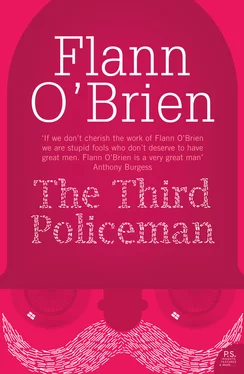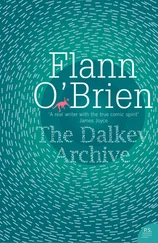Flann O’Brien - The Third Policeman
Здесь есть возможность читать онлайн «Flann O’Brien - The Third Policeman» — ознакомительный отрывок электронной книги совершенно бесплатно, а после прочтения отрывка купить полную версию. В некоторых случаях можно слушать аудио, скачать через торрент в формате fb2 и присутствует краткое содержание. Жанр: unrecognised, на английском языке. Описание произведения, (предисловие) а так же отзывы посетителей доступны на портале библиотеки ЛибКат.
- Название:The Third Policeman
- Автор:
- Жанр:
- Год:неизвестен
- ISBN:нет данных
- Рейтинг книги:5 / 5. Голосов: 1
-
Избранное:Добавить в избранное
- Отзывы:
-
Ваша оценка:
- 100
- 1
- 2
- 3
- 4
- 5
The Third Policeman: краткое содержание, описание и аннотация
Предлагаем к чтению аннотацию, описание, краткое содержание или предисловие (зависит от того, что написал сам автор книги «The Third Policeman»). Если вы не нашли необходимую информацию о книге — напишите в комментариях, мы постараемся отыскать её.
The Third Policeman — читать онлайн ознакомительный отрывок
Ниже представлен текст книги, разбитый по страницам. Система сохранения места последней прочитанной страницы, позволяет с удобством читать онлайн бесплатно книгу «The Third Policeman», без необходимости каждый раз заново искать на чём Вы остановились. Поставьте закладку, и сможете в любой момент перейти на страницу, на которой закончили чтение.
Интервал:
Закладка:
‘I would not hurt you, little man,’ he said.
‘I think I got the disorder in Mullingar,’ I explained. I knew that I had gained his confidence and that the danger of violence was now passed. He then did something which took me by surprise. He pulled up his own ragged trouser and showed me his own left leg. It was smooth, shapely and fairly fat but it was made of wood also.
That is a funny coincidence,’ I said. I now perceived the reason for his sudden change of attitude.
‘You are a sweet man,’ he responded, ‘and I would not lay a finger on your personality. I am the captain of all the one-legged men in the country. I knew them all up to now except one – your own self – and that one is now also my friend into the same bargain. If any man looks at you sideways, I will rip his belly.’
That is very friendly talk,’ I said.
‘Wide open,’ he said, making a wide movement with his hands. ‘if you are ever troubled, send for me and I will save you from the woman.’
‘Women I have no interest in at all,’ I said smiling.
‘A fiddle is a better thing for diversion.’
‘It does not matter. If your perplexity is an army or a dog, I will come with all the one-leggèd men and rip the bellies. My real name is Martin Finnucane.’
‘It is a reasonable name,’ I assented.
‘Martin Finnucane,’ he repeated, listening to his own voice as if he were listening to the sweetest music in the world. He lay back and filled himself up to the ears with dark smoke and when he was nearly bursting he let it out again and hid himself in it.
‘Tell me this,’ he said at last. ‘Have you a desideratum?’
This queer question was unexpected but I answered it quickly enough. I said I had.
‘What desideratum?’
‘To find what I am looking for.’
‘That is a handsome desideratum,’ said Martin Finnucane. ‘What way will you bring it about or mature its mutandum and bring it ultimately to passable factivity?’
‘By visiting the police barracks,’ I said, ‘and asking the policemen to direct me to where it is. Maybe you might instruct me on how to get to the barrack from where we are now?’
‘Maybe indeed,’ said Mr Finnucane. ‘Have you an ultimatum?’
‘I have a secret ultimatum,’ I replied.
‘I am sure it is a fine ultimatum,’ he said, ‘but I will not ask you to recite it for me if you think it is a secret one.’
He had smoked away all his tobacco and was now smoking the pipe itself, judging by the surly smell of it. He put his hand into a pocket at his crotch and took out a round thing.
‘Here is a sovereign for your good luck,’ he said, ‘the golden token of your golden destiny.’
I gave him, so to speak, my golden thank-you but I noticed that the coin he gave me was a bright penny. I put it carefully into my pocket as if it were highly prized and very valuable. I was pleased at the way I had handled this eccentric queerly-spoken brother of the wooden leg. Near the far side of the road was a small river. I stood up and looked at it and watched the white water. It tumbled in the stony bedstead and jumped in the air and hurried excitedly round a corner.
The barracks are on this same road,’ said Martin Finnucane, ‘and I left it behind me a mile away this today morning. You will discover it at the place where the river runs away from the road. If you look now you will see the fat trout in their brown coats coming back from the barracks at this hour because they go there every morning for the fine breakfast that is to be had from the slops and the throwings of the two policemen. But they have their dinners down the other way where a man called MacFeeterson has a bakery shop in a village of houses with their rears to the water. Three bread vans he has and a light dog-cart for the high mountain and he attends at Kilkishkeam on Mondays and Wednesdays.’
‘Martin Finnucane,’ I said, ‘a hundred and two difficult thoughts I have to think between this and my destination and the sooner the better.’
He sent me up friendly glances from the smokey ditch.
‘Good-looking man,’ he said, ‘good luck to your luck and do not entertain danger without sending me cognisance.’
I said ‘Good-bye, Good-bye’ and left him after a handshake. I looked back from down the road and saw nothing but the lip of the ditch with smoke coming from it as if tinkers were in the bottom of it cooking their what-they-had. Before I was gone I looked back again and saw the shape of his old head regarding me and closely studying my disappearance. He was amusing and interesting and had helped me by directing me to the barracks and telling me how far it was. And as I went upon my way I was slightly glad that I had met him.
A droll customer.
Chapter 4
Of all the many striking statements made by de Selby, I do not think that any of them can rival his assertion that ‘a journey is an hallucination’. The phrase may be found in the Country Album 1 cheek by jowl with the well-known treatise on ‘tent-suits’, those egregious canvas garments which he designed as a substitute alike for the hated houses and ordinary clothing. His theory, insofar as I can understand it, seems to discount the testimony of human experience and is at variance with everything I have learnt myself on many a country walk. Human existence de Selby has defined as ‘a succession of static experiences each infinitely brief, a conception which he is thought to have arrived at from examining some old cinematograph films which belonged probably to his nephew. 2 From this premise he discounts the reality or truth of any progression or serialism in life, denies that time can pass as such in the accepted sense and attributes to hallucinations the commonly experienced sensation of progression as, for instance, in journeying from one place to another or even ‘living’. If one is resting at A, he explains, and desires to rest in a distant place B, one can only do so by resting for infinitely brief intervals in innumerable intermediate places. Thus there is no difference essentially between what happens when one is resting at A before the start of the ‘journey’ and what happens when one is ‘en route’, i.e., resting in one or other of the intermediate places. He treats of these ‘intermediate places’ in a lengthy footnote. They are not, he warns us, to be taken as arbitrarily-determined points on the A-B axis so many inches or feet apart. They are rather to be regarded as points infinitely near each other yet sufficiently far apart to admit of the insertion between them of a series of other ‘inter-intermediate’ places, between each of which must be imagined a chain of other resting-places – not, of course, strictly adjacent but arranged so as to admit of the application of this principle indefinitely. The illusion of progression he attributes to the inability of the human brain – ‘as at present developed’ – to appreciate the reality of these separate ‘rests’, preferring to group many millions of them together and calling the result motion, an entirely indefensible and impossible procedure since even two separate positions cannot obtain simultaneously of the same body. Thus motion is also an illusion. He mentions that almost any photograph is conclusive proof of his teachings.
Whatever about the soundness of de Selby’s theories, there is ample evidence that they were honestly held and that several attempts were made to put them into practice. During his stay in England, he happened at one time to be living in Bath and found it necessary to go from there to Folkestone on pressing business. 3 His method of doing so was far from conventional. Instead of going to the railway station and inquiring about trains, he shut himself up in a room in his lodgings with a supply of picture postcards of the areas which would be traversed on such a journey, together with an elaborate arrangement of clocks and barometric instruments and a device for regulating the gaslight in conformity with the changing light of the outside day. What happened in the room or how precisely the clocks and other machines were manipulated will never be known. It seems that he emerged after a lapse of seven hours convinced that he was in Folkestone and possibly that he had evolved a formula for travellers which would be extremely distasteful to railway and shipping companies. There is no record of the extent of his disillusionment when he found himself still in the familiar surroundings of Bath but one authority 4 relates that he claimed without turning a hair to have been to Folkestone and back again. Reference is made to a man (unnamed) declaring to have actually seen the savant coming out of a Folkestone bank on the material date.
Читать дальшеИнтервал:
Закладка:
Похожие книги на «The Third Policeman»
Представляем Вашему вниманию похожие книги на «The Third Policeman» списком для выбора. Мы отобрали схожую по названию и смыслу литературу в надежде предоставить читателям больше вариантов отыскать новые, интересные, ещё непрочитанные произведения.
Обсуждение, отзывы о книге «The Third Policeman» и просто собственные мнения читателей. Оставьте ваши комментарии, напишите, что Вы думаете о произведении, его смысле или главных героях. Укажите что конкретно понравилось, а что нет, и почему Вы так считаете.






![О Генри - Бляха полицейского О’Руна [The Badge of Policeman O'Roon]](/books/405347/o-genri-blyaha-policejskogo-o-runa-the-badge-of-po-thumb.webp)





